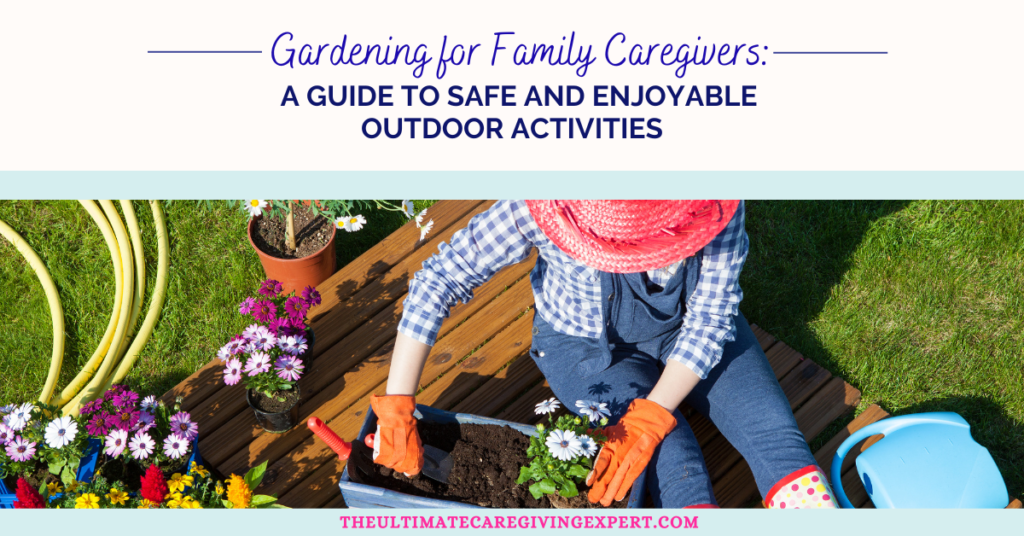Gardening for Family Caregivers
Gardening for family caregivers was one of my favorite things to do, caring for my uncle. He hated to be inside and loved his garden. We would grow so many delicious things and breed the most beautiful roses. As family caregivers, we understand the immense responsibility and dedication required to care for our loved ones. However, amidst the demands of caregiving, it’s essential to prioritize our own well-being. One way to do this is by incorporating outdoor activities like gardening into our routine. Not only does gardening offer much-needed stress relief and relaxation, but it also provides an opportunity to connect with nature and enjoy the outdoors. In this article, we’ll explore how family caregivers can safely enjoy the therapeutic benefits of gardening while ensuring the well-being of both themselves and their loved ones.
The Joy of Gardening
Gardening is a deeply fulfilling and therapeutic hobby that provides a multitude of benefits. Beyond just growing plants, it allows individuals to connect with nature, rejuvenate their spirits, and revel in the tranquility of the outdoors. For family caregivers, gardening offers a much-needed respite from the often overwhelming demands of caregiving. It provides a serene and peaceful environment where they can unwind, recharge, and find solace in the beauty of their surroundings. Moreover, gardening presents a unique opportunity for family caregivers to bond with their loved ones in a meaningful way, creating lasting memories and fostering a deeper connection through shared experiences amidst nature’s embrace.
Safe Gardening Practices
a. Proper Lifting Techniques:
When lifting heavy pots or bags of soil, it’s crucial to prioritize your safety to avoid strain or injury. Remember to bend your knees and keep your back straight while lifting to distribute the weight evenly. Consider using a gardening cart or asking for assistance when handling heavy items to reduce the risk of injury and ensure a safe gardening experience for both you and your loved ones.
b. Sun Protection:
Protecting your skin from harmful UV rays is essential while gardening. Wear sunscreen with a high SPF, a wide-brimmed hat, and sunglasses to shield yourself from the sun’s harsh rays. Remember to take frequent breaks in the shade, especially during the hottest parts of the day, to prevent sunburn and heat-related illnesses. Prioritizing sun protection ensures a safer and more enjoyable gardening experience for both you and your loved ones.
c. Hydration:
Staying hydrated is vital while gardening, especially in warm weather. Make sure to drink plenty of water throughout the day to prevent dehydration. Keep a water bottle nearby and take regular breaks to rehydrate and refresh yourself. By prioritizing hydration, you’ll ensure both your well-being and the success of your gardening endeavors.
d. Preventing Strain or Injury:
To prevent strain or injury while gardening, it’s essential to alternate between different tasks to avoid repetitive motions. Additionally, using ergonomic tools with padded handles can help reduce strain on your joints and muscles. By incorporating these practices into your gardening routine, you can ensure a safer and more enjoyable experience for both yourself and your loved ones.
Making Gardening a Family Activity
Gardening offers a unique opportunity for family bonding and shared experiences. Encouraging your loved ones to participate in gardening activities can strengthen family ties and create cherished memories. Assigning age-appropriate tasks such as watering plants, pulling weeds, or planting seeds not only fosters a sense of responsibility but also teaches valuable life skills. Additionally, working together in the garden promotes communication, teamwork, and a sense of accomplishment as you watch your garden thrive and grow. By making gardening a family activity, you not only nurture your plants but also the relationships within your family.
Creating an Accessible Garden
For family caregivers who are caring for a loved one with mobility issues, creating an accessible garden can significantly enhance their gardening experience. By making simple adjustments, such as using raised garden beds, vertical planters, and wide pathways, you can ensure that gardening is both easy and enjoyable for everyone involved. An accessible garden not only allows your loved one to participate more fully but also promotes inclusivity and enables them to enjoy the therapeutic benefits of gardening alongside you. Here are some types of plants that are well-suited for creating an accessible garden:
-
Herbs:
- Basil
- Thyme
- Mint
- Parsley
-
Vegetables:
- Tomatoes (dwarf or determinate varieties)
- Peppers (bell peppers or mini sweet peppers)
- Lettuce (leaf lettuce or butterhead varieties)
- Bush beans
-
Flowers:
- Marigolds
- Pansies
- Zinnias
- Sunflowers (dwarf varieties)
-
Fruits:
- Strawberries (grown in hanging baskets or raised beds)
- Blueberries (dwarf varieties in containers)
- Dwarf apple or pear trees (grown in containers)
- Raspberries (thornless varieties in raised beds)
-
Other Accessible Plants:
- Succulents (in pots or vertical planters)
- Dwarf varieties of shrubs or ornamental grasses
- Scented plants like lavender or rosemary
These plants are not only easy to care for but can also be grown in containers, raised beds, or vertical planters, making them accessible for individuals with mobility issues.
Enjoying the Fruits of Your Labor
After dedicating time and effort to your garden, there’s nothing quite like the satisfaction of harvesting fresh fruits, vegetables, or flowers. Whether it’s a vibrant homegrown salad, a fragrant bouquet of freshly picked flowers, or a basket overflowing with ripe berries, take a moment to savor the fruits of your labor. Celebrate your gardening successes and enjoy the tangible rewards that come from nurturing and caring for your garden. It’s not just about the plants you grow but also about the joy and fulfillment they bring to your life and the lives of your loved ones.
Conclusion
Gardening is not only a rewarding hobby but also a therapeutic activity that can benefit both family caregivers and their loved ones. By following these simple tips for safe gardening practices, you can enjoy the outdoors while promoting your own well-being and that of those you care for. From the joy of nurturing plants to the satisfaction of harvesting your own homegrown produce, gardening offers countless opportunities for relaxation, bonding, and enjoyment. So, grab your gardening gloves, step outside, and let nature work its magic, creating beautiful moments and lasting memories for you and your family. Know that I am here for you to help in any way.





